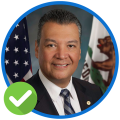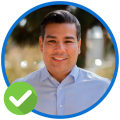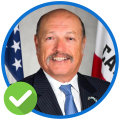Reelect Congressional Representative Zoe Lofgren to keep CD-18 on the right track for progress.
Rep. Lofgren’s track record and policy positions demonstrate that she will continue to be a representative voice for the constituents of CD-18 and will govern effectively in the best interest of this diverse district.
Progressive endorsements: Rep. Lofgren has the endorsement of some progressive groups, including Planned Parenthood, California Labor Federation, and United Farm Workers.
Top issues: Rep. Lofgren supports immigration reform, and has sponsored legislation that would require a minimum number of refugees to be admitted to the United States as well as to streamline immigration processes. She has also paid special attention to improving how Congress functions, including supporting legislation that requires members and employees of Congress to complete training in workplace rights and responsibilities as well as to regulate the frequency of redistricting.
Priority bills: This year, Rep. Lofgren’s priorities for CD-18 have included 30 bills about Congress, immigration, and international affairs. Of these, two have successfully been passed by the House. She has sponsored and passed legislation to require law enforcement to obtain a warrant before retrieving communications and documents stored remotely about an individual.
Member of the Congressional Progressive Caucus?: Yes
Committee leadership/membership: Rep. Lofgren currently chairs the Committee on House Administration.
Governance and community leadership experience: Rep. Lofgren has served in this congressional seat since 1994, when she was elected with over 45% of the vote. In 2020, she won her 2020 reelection against a Republican challenger by 51 points.
Prior to her role as a member of Congress, she was an immigration lawyer, taught at Santa Clara Law School, and served as staff assistant to Congressmember Don Edwards. Rep. Lofgren has been a longtime supporter of women’s rights, abortion protections, and LGBTQIA+ equity.
Other background: Rep. Lofgren was born and raised in the Bay Area, and attended Stanford and Santa Clara Law School. In Congress, she helped pass the DREAM Act of 2019 (and 2010), and the Farm Workforce Modernization Act in the House. She has opposed the Trump administration's immigration policies, and has called for an end to the detention centers, and for foreign aid to end the instability in Central America that leads to people fleeing their homes. As the representative for the heart of Silicon Valley, she has been active on internet and technology issues. She fought the controversial Stop Online Piracy Act (SOPA) and the NSA surveillance of Americans, and recently introduced the Online Privacy Act. However, she has been criticized for not taking a stronger stance on holding Big Tech more accountable, even on antitrust bills that have bipartisan support and despite strong support from her constituents.
The Race
Primary election results: The June 2022 results included Zoe Lofgren (D), 56%; Peter Hernandez (R), 31%; and Luis Acevedo-Arreguin (D), 12%. Lofgren and Hernandez will compete in a run-off in the November 8 general election.
Candidate fundraising and pledges: Rep. Lofgren’s campaign has raised $1.5 million and is not funded by police money.
Opposing candidate: Republican Peter Hernandez
Opposing candidate’s fundraising and pledges: Hernandez’s campaign has raised $70,000 and is funded by individual donations and two committees.
The District
Counties in district: California’s 18 Congressional District includes parts of Santa Clara, Monterey, San Benito, and Santa Cruz Counties.
Voter registration: 51% Democrat, 18% Republican, and 23% No Party Preference. Democrats have held this district since 1982. Since the 2021 redistricting process, CD-18 is 3% more Democratic than it was during the 2020 general election cycle.
District demographics: 51% Latino, 14% Asian, and 3% Black. This district is considered to be one of the 16 strong Latino seats in the California congressional delegation.
Recent election results: CD-18 voted for Biden for president in 2020 by 42 points and Newsom for governor in 2018 by 39 points.
The Position
Congressmembers represent and advocate for the needs of their district constituents at the United States Capitol. They are responsible for creating, debating, and voting on legislation that addresses issues within their district.
The United States is divided into 435 congressional districts, each with a population of about 710,000 individuals. Each district elects a representative to the House of Representatives for a two-year term. California has 53 congressional representatives, the largest delegation in the country. There is no term limit for this position.
Reelect Congressional Representative Zoe Lofgren to keep CD-18 on the right track for progress.
Rep. Lofgren’s track record and policy positions demonstrate that she will continue to be a representative voice for the constituents of CD-18 and will govern effectively in the best interest of this diverse district.
Progressive endorsements: Rep. Lofgren has the endorsement of some progressive groups, including Planned Parenthood, California Labor Federation, and United Farm Workers.
Top issues: Rep. Lofgren supports immigration reform, and has sponsored legislation that would require a minimum number of refugees to be admitted to the United States as well as to streamline immigration processes. She has also paid special attention to improving how Congress functions, including supporting legislation that requires members and employees of Congress to complete training in workplace rights and responsibilities as well as to regulate the frequency of redistricting.
Priority bills: This year, Rep. Lofgren’s priorities for CD-18 have included 30 bills about Congress, immigration, and international affairs. Of these, two have successfully been passed by the House. She has sponsored and passed legislation to require law enforcement to obtain a warrant before retrieving communications and documents stored remotely about an individual.
Member of the Congressional Progressive Caucus?: Yes
Committee leadership/membership: Rep. Lofgren currently chairs the Committee on House Administration.
Governance and community leadership experience: Rep. Lofgren has served in this congressional seat since 1994, when she was elected with over 45% of the vote. In 2020, she won her 2020 reelection against a Republican challenger by 51 points.
Prior to her role as a member of Congress, she was an immigration lawyer, taught at Santa Clara Law School, and served as staff assistant to Congressmember Don Edwards. Rep. Lofgren has been a longtime supporter of women’s rights, abortion protections, and LGBTQIA+ equity.
Other background: Rep. Lofgren was born and raised in the Bay Area, and attended Stanford and Santa Clara Law School. In Congress, she helped pass the DREAM Act of 2019 (and 2010), and the Farm Workforce Modernization Act in the House. She has opposed the Trump administration's immigration policies, and has called for an end to the detention centers, and for foreign aid to end the instability in Central America that leads to people fleeing their homes. As the representative for the heart of Silicon Valley, she has been active on internet and technology issues. She fought the controversial Stop Online Piracy Act (SOPA) and the NSA surveillance of Americans, and recently introduced the Online Privacy Act. However, she has been criticized for not taking a stronger stance on holding Big Tech more accountable, even on antitrust bills that have bipartisan support and despite strong support from her constituents.
The Race
Primary election results: The June 2022 results included Zoe Lofgren (D), 56%; Peter Hernandez (R), 31%; and Luis Acevedo-Arreguin (D), 12%. Lofgren and Hernandez will compete in a run-off in the November 8 general election.
Candidate fundraising and pledges: Rep. Lofgren’s campaign has raised $1.5 million and is not funded by police money.
Opposing candidate: Republican Peter Hernandez
Opposing candidate’s fundraising and pledges: Hernandez’s campaign has raised $70,000 and is funded by individual donations and two committees.
The District
Counties in district: California’s 18 Congressional District includes parts of Santa Clara, Monterey, San Benito, and Santa Cruz Counties.
Voter registration: 51% Democrat, 18% Republican, and 23% No Party Preference. Democrats have held this district since 1982. Since the 2021 redistricting process, CD-18 is 3% more Democratic than it was during the 2020 general election cycle.
District demographics: 51% Latino, 14% Asian, and 3% Black. This district is considered to be one of the 16 strong Latino seats in the California congressional delegation.
Recent election results: CD-18 voted for Biden for president in 2020 by 42 points and Newsom for governor in 2018 by 39 points.
The Position
Congressmembers represent and advocate for the needs of their district constituents at the United States Capitol. They are responsible for creating, debating, and voting on legislation that addresses issues within their district.
The United States is divided into 435 congressional districts, each with a population of about 710,000 individuals. Each district elects a representative to the House of Representatives for a two-year term. California has 53 congressional representatives, the largest delegation in the country. There is no term limit for this position.













